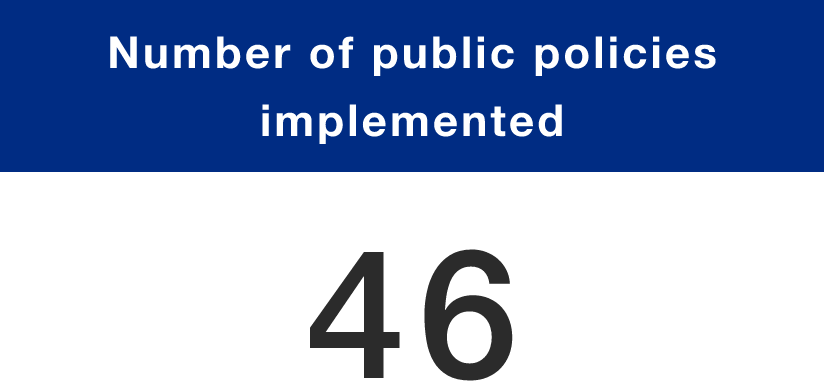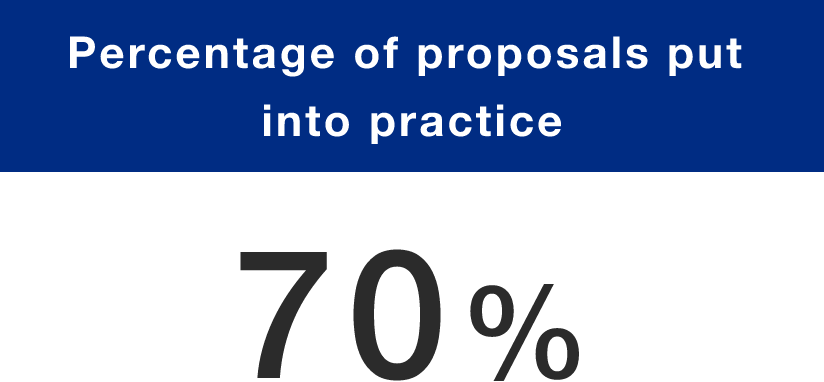Policy Proposals


If politicians and bureaucrats can’t do it, KOSO NIPPON will do it.
What policies are truly needed for the nation? If the policies lie within a realm that is out of reach of politicians and bureaucrats, we as members of the public need to create them, propose them, and make them happen. With this idea in mind, KOSO NIPPON has proposed 65 public policies since its foundation in 1997. Of these, 46 policies led to legislative amendments or Cabinet decisions, achieving a 70% successful implementation rate. In the Residents Councils we have held throughout Japan, we gather ideas and thoughts from the public and recommend policies that reflect the reality of people’s day-to-day lives. We always follow through on our proposals and keep working to bring them to fruition, no matter how many years it takes.

Healthcare System
In Japan, doctors focus on organ-specific tests and treatments, resulting in a massive amount of healthcare expenditure. What we need instead is a unified system centered on treatment of the whole body and mind, where healthcare and nursing care are integrated. To achieve this goal, we need to make improvements to primary care, such as family doctors and home-visit treatment, train specialist doctors, nurses, and other healthcare providers, and reform the current healthcare service fee system.

Local Finance
The primary role of financial institutions is to take in funds that are not needed at the moment, called deposits, pool them, and lend them out in the form of loans. Yet many regional financial institutions lend only half of their deposits to local people and businesses, and invest the rest in government bonds and other securities. While megabanks do their business on a global scale, regional financial institutions generally engage in more personalized finance, and think of their customers’ business as their own business. We can call it a monetary version of ‘local production for local consumption.’ What KOSO NIPPON offers is a mechanism to make this happen.

National and
Local Governments
Creative ingenuity that takes advantage of regional diversity is the key to making local communities more attractive to everyone, which in turn energizes the entire nation. To encorage this kind of ingenuity, we need to make fundamental changes in the rules and regulations imposed by the national government on local governments through taxation, budgetary allocations, and subsidies. This means doing away with both the national government’s control over regions and municipalities as well as local governments’ dependence on the national government.

Governance of
Political Parties
For corporations, organizations, and institutions alike, the greater the social impact and higher the visibility of the organization, the more rigorous corporate governance (self-governance) and stricter rules that are required. In the case of corporations, this situation applies more to publicly listed companies than unlisted companies. Yet for political parties, which have the highest level of visibility, those rules do not apply, even though they receive more than fifty billion yen from tax revenues, tax-deductible donations, and the like. This lack of rules is also the cause of their endless scandals and dubious use of the funds. One of our proposals is the establishment of a Political Parties Act. Japanese political parties and politicians do not have a self-cleansing ability, so we need to develop an effective governance structure based on laws that cover matters such as responsibilities of board members, accounting audits, and relationships between headquarters and branch offices.

Educational Administration
In Japan, the administration of public schools, including authority over and responsibility for school construction, budgets, human resources, curricula, and all other matters, is divided among prefectural governments, municipalities, and boards of education. In addition, while boards of education are considered independent bodies, the management of their budgets and human resources are under government control. Furthermore, the Ministry of Education effectively has a web of control over all of these. This structure is the cause behind the excessive paperwork and lack of responsibility found throughout the educational administration. In order to solve issues like bullying, truancy, one-size-fits-all education, and declining academic performance, we need to change this administrative structure from the ground up. We need reforms that will create an educational administration where free discussion takes place, and which makes use of local ingenuity.
Examples of realized proposals
Public Benefit Corporation System
(Our reform plan was proposed in 2001 and enacted in 2006)

Since its founding, KOSO NIPPON has been working to reform the public benefit corporation system. This is because such reform is not merely about public benefit corporations, but goes to the very foundation of the nation and its politics: what is ‘public benefit,’ and who decides what is in the public interest? Under the old system, public benefit was something determined by the state. We drew up a reform plan based on the idea that ‘public benefit’ means ‘everyone’s benefit,’ and therefore, the public should decide on it. It took us nine years to bring this proposal to fruition. Since then, we have continued to follow up in order to further improve the system.
Public Accounting System
(In 1999, we drafted and presented a national balance sheet,
which was put in place as a Public Services Cost Statement from 2000 onward)

KOSO NIPPON drafted and presented Japan’s first national balance sheet in 1999. At the same time, we attempted to introduce public accounting, using accrual accounting and double-entry bookkeeping, in several local governments. This led to the Japanese government’s preparation of a national financial statement, albeit an unofficial one. At that point, the Ministry of Internal Affairs and Communications put the brakes on this movement, but in 2015, the same ministry finally encouraged local governments to implement public accounting. Unfortunately, however, it is not yet working well. We need to fully implement the public accounting system in local governments in order to deal appropriately with aging infrastructure, such as bridges, and public facilities. As a side note, KOSO NIPPON also initiated the Public Services Cost Statement, which is similar to a company’s profit and loss statement, and is currently in use by many local governments.
Act for the Establishment of Ministries and Agencies
(Discussions started around 1997, and the policy was implemented in 1999)

This was the first policy proposed by KOSO NIPPON that was enacted into law. Although a lesser-known subject, like the reform of the public benefit corporation system, it goes to the very foundation of the nation and its politics. Japanese government offices are said to have broad discretionary powers. Government authority is based on individual laws, but the Act for the Establishment of Ministries and Agencies (a law that outlines the tasks and assignments of each ministry and agency) used to contain ‘authority provisions,’ which were the basis for many administrative proposals. KOSO NIPPON proposed to abolish these provisions, and after a great deal of effort lobbying the ruling and opposition parties and promoting our plan in the media, we made it a reality. However, in order to eliminate the hierarchical administrative system and to reorganize ministries and agencies so that they can flexibly respond to changes in society, we believe that the Act for the Establishment of Ministries and Agencies should be abolished altogether.


